The Museum Collections
Introduction
I. History and Art Collection
1. Icons of the 14th – 19th centuries
icons of the 14th – 17th century
2. Jewelry art of the 14th – 20th century
jewelry art of the 14th – 17th century
jewelry art of the 18th – 19th century
the european silver 14th - 19th centuries
3. Small-size sculptures (works of metal, wood, bone)
XI – the beginning of the XX century
Small-size sculptures 11th – 17th century
Small-size sculptures 18th – early 20th century
enamel of Troitza masters 15-8th – early 20th century
5.Embroidery, lace, textiles of the 14th - early 20th century
icon and ornamental embroidery
gold and silver lace
6.Painting of the 18th – 21st centuries
painting of the 18th – 19th centuris
painting of the 20th – 21st centuris
II.Manuscripts and old printed books of the 14th – 17th century
IV.Lithography of the 18th – 19th century
V.Numismatics
VI.Medals of the 18th - early 20th century
VIII.Archeology collection
IX. Russian folk and applied and decorative art of the 17th – 21st c.
1. Artistic wood
folk carved and painted wood
wooden toys
house carving of Sergiev Posad
Khokhloma and Gorodets painting
2. Artistic textiles
embroidery and weaving
printed textiles and lace
Russian shawls
folk costumes
folk garments
printed cotton kerchiefs
|
Small-size Works of the 11th – 17th Centuries (page 2) |
|
28 ivory carved plaques of the late 15th century, that were once inserted in the earlier cross, decorate now the altar cross of the 17th century. They are in gilded cases shining through the lace-like compositions. The compositions character and carving methods prove the work of several craftsmen. Ambrose probably made figures of Christ in the Crucifixion, Angels in the Trinity, the Virgin and Archangel Michael from the Deesis range, St. George, St. Gerasim with a lion and the Deposition from the Cross.
|
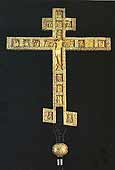
Deesis, Feasts and Saints. Altar cross. Second half of the 15th century; 17th – 19th centuries. Obverse |
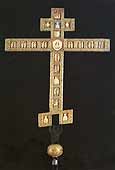
Deesis, Feasts and Saints. Altar cross. Second half of the 15th century; 17th – 19th centuries. Reverse |
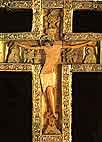
Deesis, Feasts and Saints. Altar cross. Second half of the 15th century; 17th – 19th centuries. Detail |
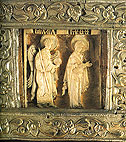
Deesis, Feasts and Saints. Altar cross. Second half of the 15th century; 17th – 19th centuries. Detail
|
The images in other miniatures, made by professional craftsmen as well, are different. The saint warriors Mercury and Nestor are the most interesting figures among them. The iconography of the compositions on the cross is worthy of attention. The variant of the scene “The Appearance of the Virgin to St. Sergius of Radonezh” differs from the same composition on the altar cross. The Virgin is accompanied by two Apostles, St. Sergius is kneeling at her feet, St. Micheas is seen in the opening of the cell.
|
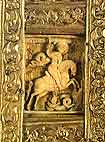
Deesis, Feasts and Saints. Altar cross. Second half of the 15th century; 17th – 19th centuries. Detail |
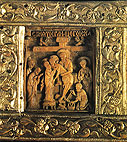
Deesis, Feasts and Saints. Altar cross. Second half of the 15th century; 17th – 19th centuries. Detail |
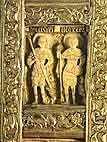
Deesis, Feasts and Saints. Altar cross. Second half of the 15th century; 17th – 19th centuries. Detail |
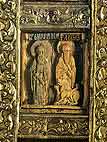
Deesis, Feasts and Saints. Altar cross. Second half of the 15th century; 17th – 19th centuries. Detail
|
Wood and ivory carving, brought to perfection by Ambrose, existed in the Monastery in the subsequent centuries. In the second half of the 16th century, complicated many-figured compositions were wide-spread. They were mainly carved in wood and ivory, works of stone were not so numerous as in the previous century. The iconography of small-size sculpture was developing. On the other hand, it was nationally prescribed to follow the official cannons that resulted in certain regularity. “The Transfiguration” icon, donated by Princess Kilikia Ushataya (?) and the diptych with the ivory carved compositions “In Thee Rejoiceth” and “Praise to the Holiest” are characteristic specimens of that time.
|
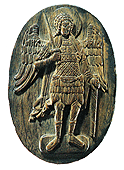
Archangel Michael. Pectoral icon. Late 15th century |
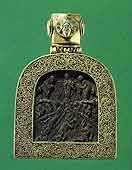
The Transfiguration. Pectoral icon. 16th century |
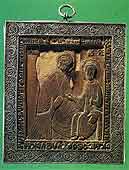
The Virgin Hodigitria. Pectoral icon. Late 15th century |
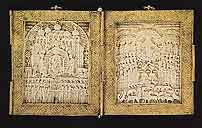
“In Thee Rejoiceth” and “Praise to the Holiest”. Folding icon. 16th century
|
In the 16th century the Trinity Monastery was a kind of workshop producing pectoral icons, crosses and panagias in large amount. The works carved in wood and in bone were mass produced for the Monastery clergymen and for sale. The Monastery documents recorded the names of the craftsmen: “Eusebius – a cross maker”, Pyotr – “a silversmith”. The artistic techniques of Ambrose carving were used in the icon of oak donated by Kilikia Ushataya. The Trinity carvers made two folding icons with complicated many-figured compositions (one depicting the Trinity, the Appearance of the Virgin to Sergius of Radonezh and the Crucifixion donated by the Trinity elder Vassian, the other – the Crucifixion, the Virgin of the Sign, the Trinity, SS Sergius and Nikon of Radonezh. The best specimens of the Trinity and Moscow masters were copied, yet distorted by the provincial craftsmen. That could be observed in numerous castings common in the northern and southern provinces. Metal engravings of the 16th century were closely connected with miniature sculptures in pectoral icons, panagias and crosses .
The Museum collection of the 17th century carved works is comparatively small. At that time complicated carvings were replaced by brass castings that were sometimes made from the ancient moulds. At the same time the pectoral icons, crosses and panagias turned from “relics” to decorative objects. Their precious settings played a considerable role. They were often adorned with magnificent filigree, enamel and chasing.
|
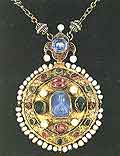
Panagia. Early 17th century. Obverse. The 11th century Byzantine cameo with the image of the Savior in the middle. |
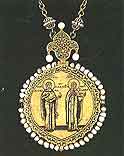
Panagia. Early 17th century. Reverse. Engraving and niello. Christ, Mary Magdalene, Xenia of Rome. |
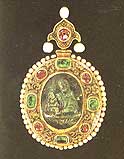
Panagia. Late 16th – early 17th century. Belonged to Patriarch Filaret Nikitich. Obverse. Cameo of jasper with the image of the Virgin |
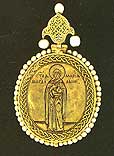
Panagia. Late 16th – early 17th century. Belonged to Patriarch Filaret Nikitich. Reverse. Engraving and niello. Mary Magdalene |
|
|


